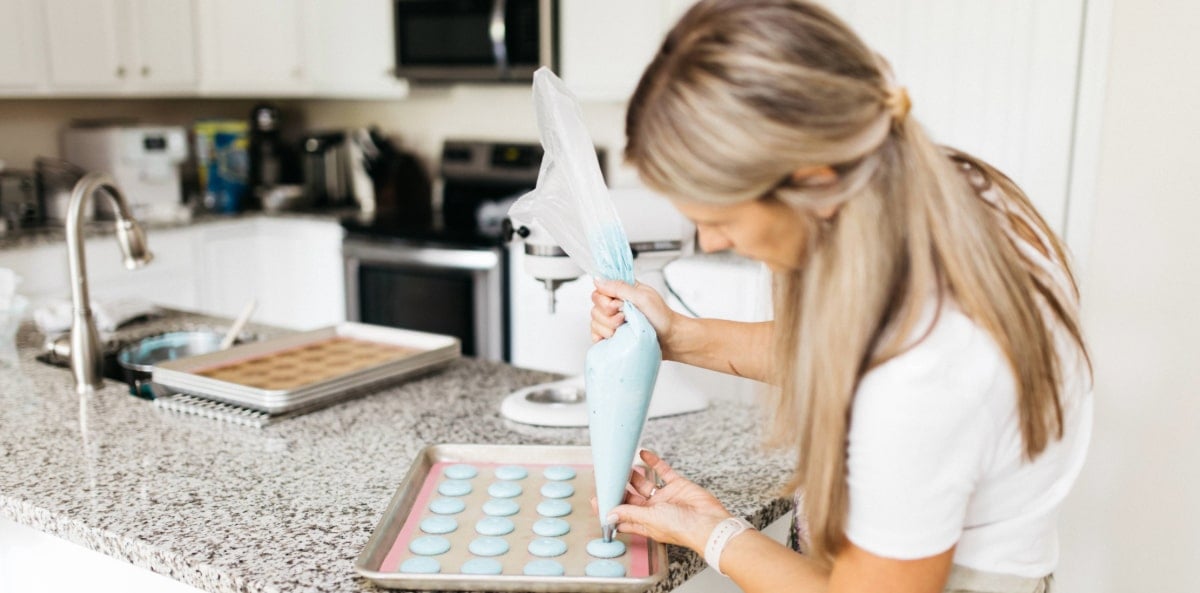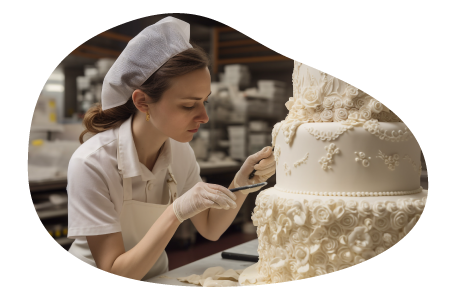Do I need insurance to sell baked goods from home?

Home-based bakeries have become increasingly popular in recent years. They are a great way to earn income from your own home thanks to the freedom and flexibility they offer. Many consumers also prefer to buy home-based bakery products knowing they're made to the highest standards with the freshest ingredients.
If you sell or are planning to sell home bakery items, it’s important for you to understand the legal requirements that come with that, as well as to obtain the right insurance coverage. This will allow you to focus on what you do best — creating delicious baked goods — instead of having to deal with expensive and time-consuming liability issues.
Understanding your local regulations for home bakeries
Is it legal to sell baked goods from your home?
In most places it is, but you should check with your state and local authorities (county and city) to make sure you have the necessary licenses and permits, such as a business license, catering license, or food handlers license. You will also have to comply with all health department regulations. These requirements will vary depending on where you live.
States also have cottage food laws that bakers must follow. A cottage food business involves home bakers making food products to sell in a home kitchen. Cottage food laws allow you to operate a home-based baking business without having to deal with the stricter licensing and regulatory requirements of a commercial kitchen.
Do I need a permit to sell baked goods from home?
Can you sell baked goods from your home without a permit? It depends on where you live. A cottage food permit may be required in some states for culinary entrepreneurs.
Cottage food permits stipulate which products you can make, like cakes and cookies, and where they can be sold. Certain foods — like meat, dairy products, seafood, temperature-sensitive foods, and others — are usually prohibited to protect consumers from potential food-borne illnesses.
Even if a permit is not required, you must still follow the cottage food laws in your state. California, Colorado, and Florida, for example, don't require permits to sell cottage foods. There are important differences, however, in the types of foods you can make, the training requirements, and how much you can sell.
California
In The Golden State, home-based bakeries are only permitted to sell certain foods depending on whether you sell directly to the public (Class A) or you sell directly to the public or indirectly through restaurants and food markets (Class B).
All home-based bakeries must meet the requirements of the California Health and Safety Code, which includes guidelines for preparing, packing, and labeling food products, training, and other requirements. Class A sellers are limited to $75,000 in annual sales, while Class B sellers are limited to $150,000 annually.
Colorado
In Colorado, home-based bakeries are governed by the Colorado Cottage Foods Act. Bakeries are only permitted to sell certain foods (e.g., jams, jellies, etc.) and the Colorado Cottage Foods Act also requires bakers to complete a food safety course before they can start making and selling products.
An important area where Colorado differs from California is in how cottage foods are sold. While California permits cottage foods to be sold directly to consumers or indirectly through restaurants and food markets, Colorado only permits cottage foods to be sold directly to consumers.
Colorado also limits the amount of sales a baker can make to $10,000 per flavor or type of product annually.
Florida
Cottage food bakeries in Florida are only allowed to sell food directly to consumers. Similar to California and Colorado, there is an approved list of products that can be made and sold, and all products must be properly packaged and labeled.
One way that Florida’s cottage food laws differ from California and Colorado is the amount of product you can make. Florida caps the amount a cottage food operation can make to $250,000 annually.

What types of insurance should a home bakery have?
Before you start a home-based food company, it’s important to get the right insurance coverage to protect your business from risks and liabilities.
Homeowner’s insurance policies typically don’t cover home-based businesses, and you will need a cottage food insurance policy at a minimum. This type of policy provides several different types of coverage in one policy.
A cottage food insurance policy may include:
General liability insurance
General liability insurance protects your home bakery business from third-party bodily injuries and property damage. It is usually not required by state law, but is often the first type of insurance policy that a small business purchases due to the crucial protection it provides.
For example, if a customer falls in your home and hurts themselves, a general liability insurance policy would cover their medical bills. Or, if you accidentally spill a drink on a customer’s laptop and damage it, general liability coverage would cover any legal expenses.
General liability insurance also protects you from lawsuits related to libel, copyright infringement, and personal and advertising injuries.
Product liability insurance
Product liability insurance provides protection if your product harms someone or causes a financial loss. For instance, a product could be accidentally mislabeled or there could be an unintentional allergen cross-contamination, which could cause an allergic reaction.
Product liability coverage will pay for legal fees, a judgment, or a settlement if you are sued over an issue like this with your baked goods.
Tools and equipment insurance
Many home-based bakeries use specialized kitchen equipment to prepare and store their products. To protect your investment, it’s important to obtain tools and equipment coverage, which will pay to repair or replace your business’s equipment if it’s lost, stolen, or damaged while in transit or stored off-site.
Cyber insurance
Many small businesses are susceptible to various forms of cyberattacks. Cyber insurance coverage provides valuable protection in case someone hacks your website, demands a ransom for your data, or steals your customers’ credit card numbers and other personal information.
Professional liability insurance
Professional liability coverage protects your home bakery business against claims of negligence, mistakes, misrepresentations, and breaches of contract.
Also known as errors and omissions insurance (E&O), professional liability covers your legal fees, settlements, and judgments, arising from these types of issues.
What other types of coverage might my home bakery need?
Although a cottage food insurance policy provides a great deal of protection for your home-based bakery, it doesn't provide complete coverage.
Below are additional home bakery insurance policies that you may need:
Workers' compensation insurance
As your cottage food operation grows, you may eventually need to hire additional help. Even if you only have one employee, you’ll most likely need a workers’ compensation insurance policy.
Required in most states if you have one or more employees, this coverage protects your business from lawsuits related to workplace illnesses and injuries.
Even if you don't have any employees, it’s still a good idea to obtain a workers’ compensation policy since many health insurance policies don’t cover work-related injuries or illnesses.
Commercial auto insurance
If you deliver your homemade food or cater events, your insurance requirements will include a commercial auto policy for protection in case you or an employee get into an accident involving a business-owned vehicle.
A commercial auto policy covers medical expenses, property damage, legal fees, and accidents involving uninsured motorists. It can also protect against vehicle theft, physical damage, vandalism, and fire. It's important to note that personal car insurance policies typically don’t cover business-related accidents.
If you drive a personal, leased, or rented car for work purposes, then you would need hired and non-owned auto insurance (HNOA insurance). This policy covers non-business owned vehicles in the event you or an employee is in an accident while running a work errand.
Commercial property insurance
Homeowner’s insurance policies typically don’t cover business-related liabilities. If you face a fire, flood, or theft, your home baking business property won’t be covered.
Instead, you would need commercial property insurance. This policy provides coverage for your business equipment, supplies, materials, finished products, and other inventory that are for business use.
Two specific types of commercial property insurance coverages that home bakers should consider are finished stock insurance and business interruption insurance:
- A finished stock insurance policy serves as an extra safety net for small businesses that carry physical goods and products. It provides protection in the event that their stock is lost or damaged.
- Business interruption insurance provides coverage if your small business is forced to close temporarily due to a covered property claim, such as a fire. This coverage includes day-to-day expenses and rent or relocation costs.

Why insurance protection is important for your home-based food business
Food business insurance can help keep your home bakery afloat when you're dealing with a business interruption or hefty legal and medical expenses.
For example, a customer could experience food poisoning after consuming your product and sue you for damages. If you have product liability coverage, it will cover your legal fees and a potential settlement or judgment.
Or, a customer who is picking up a cake could trip in your home and break their ankle. If you have general liability coverage, it will cover the customer's medical expenses and your legal costs if you're sued.
Insurance coverage also protects your business if you're transporting your baked goods to a farmers’ market and get into a car accident. A commercial auto policy will cover expenses if you're driving a business-owned vehicle. Whereas, an HNOA policy would protect you if the accident involved your personal, rented, or leased vehicle.
In addition to obtaining the right policies for your insurance needs, home bakery business owners should also consider forming a limited liability company (LLC).
This is a special type of business entity that legally separates your personal assets from your business. If your business is an LLC and someone sues you, they will not be able to go after your home, personal bank account, and other personal assets.

Potential risks of operating without insurance
Obtaining the right insurance coverage is a must before you open for business and sell your first baked product. A lack of coverage could affect your business in several ways.
- Lawsuits: You may have to deal with significant legal expenses if you are sued, even if you win. If you have to pay a settlement or judgment, the amount could be so high that it forces you into bankruptcy.
- Lost time: The time you spend dealing with liability issues could prevent you from giving your business the full attention it deserves.
- Worker injuries: If you or an employee slips and falls, is burned, or is injured in another way, your business will be liable for the medical expenses.
- Auto accidents: Since your personal auto policy does not cover business-related activities, an accident could result in an expensive repair, the loss of your vehicle, or liability for damage to someone else's vehicle or property.
- Equipment and property damage: You will have to cover the cost of repairing or replacing baking equipment and other business property that is damaged from a fire, theft, flood, or other incident.
- Additional professional services: If a data breach or other cyber event occurs, you may have to hire IT professionals to identify vulnerabilities, implement new security controls, and notify affected customers.
Get the right insurance for your home bakery with Insureon
Finding the right policies for your business needs and budget is easy with Insureon. Just fill out our easy online application to receive free quotes from trusted U.S. insurance providers. Our licensed insurance agents are available to answer all your questions related and help you find affordable small business insurance.
Most businesses can get same-day coverage and easily download a certificate of insurance as proof of coverage right away.
Cyrus Vanover, Contributing Writer
Cyrus is a finance and insurance writer who is passionate about helping people and businesses succeed. He is also the author of the book "Earn a Debt-Free College Degree." He has written for some of the largest financial institutions in the country including TD Bank, Citizens Bank, and many credit unions. Cyrus has also contributed to Newsweek. Based in the Blue Ridge Mountains of Virginia, he enjoys hiking the local trails and exploring old Civil War battlefields and other historical sites in his spare time.







